Leadership in Diversity Fellowship
MSTP LEADERSHIP IN DIVERSITY FELLOWSHIP 2022 – 2023 RECIPIENTS
The University of Minnesota MSTP is pleased to announce the 2022 – 2023 Leadership in Diversity Fellowship recipients. This new fellowship program recognizes MSTP students who have demonstrated an exceptional commitment to diversity, equity and inclusion through leadership in initiatives that foster the program’s commitment to creating a diverse, inclusive, equitable and just climate. Congratulations to the recipients!
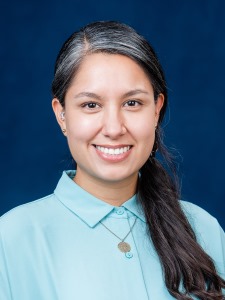
EDITH HERNANDEZ
Edith is studying translational methods of addiction treatment development in order to tailor unique treatment to individuals with psychiatric comorbidities. As part of Frente de Accion de Latinos en Minnesota (FALM) with Dr. Miguel Fiol, Edith helped organize the logistics and planning of trips that provided essential mental health support, including trauma-informed mental health workshops for children and adolescents, to refugees at the U.S./Mexico border and victims of the 2020 earthquakes in Puerto Rico. As President of the local LMSA Chapter from 2020-2021, Edith launched a national campaign where she connected with 42 LMSA chapters across the country, resulting in over $2,500 in donations from 30 cities across 15 states that brought urgent supplies to affected African-American and Latinx communities in South Minneapolis. In the MSTP, Edith has served as Co-Director of the pre-MSTP Mentoring Program. In addition to coordinating annual local and national recruitment, Edith helped design a monthly curriculum to better prepare and create community among local and national participants in the pre-MSTP Mentoring Program.
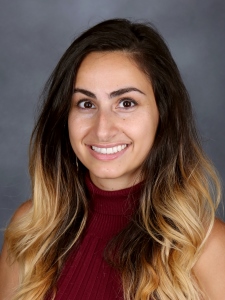
ADRINA KOCHARIAN
Adrina is studying how neurochemicals in the brain encode value during decision making in order to integrate neuroscientific findings with clinical medicine. Adrina is advocating on behalf of patients to improve public health and systemic barriers to healthcare through policy work at the state and national level. As the elected Policy Council Appointee within the Minnesota Medical Association (MMA), Adrina has represented the medical student voice in Minnesota to advocate for a state-level public option to decrease the rate of uninsured Minnesotans. Adrina is a member of the Policy Council's Task Force on Drugs of Abuse Harm Reduction and Decriminalization, which is prioritizing actions that will reduce the frequency of drug-related criminal statutes, including supporting drug checking mechanism (e.g., fentanyl testing strips), implementing good Samaritan laws to offer legal protections for people experiencing overdose and bystanders, and developing pilot studies for supervised injection sites in Minnesota. At the national level, Adrina represents medical students from 6 states in the American Medical Association (AMA) House of Delegates. She joined other medical student delegates in advocating for the expungement of criminal records pertaining to cannabis-related convictions, and adopted policy to recognize child poverty as a social determinant of health and a consequence of structural racism.
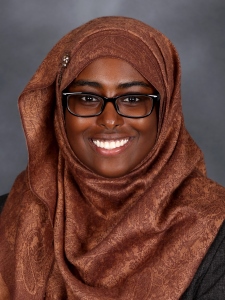
FATHIMA MOHAMED
Fathima is investigating novel approaches in immune cell modulation with a focus on metabolic reprogramming for the treatment of pediatric malignancies. She is committed to mentoring and supporting trainees from identities underrepresented in science and medicine. As a member of the executive board of the Student National Medical Association (SNMA), Fathima was able to lead initiatives that supported premedical students and the local community including the premedical forum, the mentorship program and the Health Fair. Fathima has served as a mentor to many undergraduate students through the Friend in Stem initiative led by the Empowering Women in Science group, the SNMA premedical mentorship program and the pre-MSTP Mentoring Program. As a member of the MSTP Justice, Equity, Diversity and Inclusion (JEDI) Committee, Fathima has organized monthly meetings focused on racial and gender equity in academia, highlighted the work of physician scientists from underrepresented backgrounds, and helped organize a session on physician scientists and MD/PhD programs at The Ladder. Through the Center for Immunology's Association of Immunologists for Racial Equity (AIRE), Fathima organized a postdoctoral seminar series to improve the recruitment of talented and diverse junior faculty.
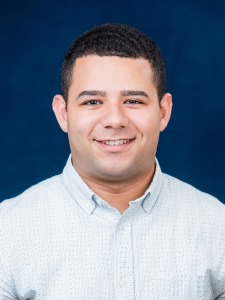
JOSÉ VALENTIN LÓPEZ
José is investigating the underlying mechanisms of cancer and the discovery of potential therapies to improve patient care. José plans to use his understanding of science and medicine to continue to strongly advocate for disadvantaged communities with the goal of eliminating health disparities. José has served as Vice President and social media representative for the University of Minnesota Chapter of the Latino Medical Student Association (LMSA). José co-led a national effort to donate needed items to food banks in South Minneapolis following the murder of George Floyd. To advocate for underserved patients, José joined the Twin Cities Medical Society’s (TCMS) Dr. Pete Dehnel Public Health Advocacy Fellowship, where he worked to reduce disparities related to interpreting services in healthcare settings in the Twin Cities. Through his mentoring and outreach activities, José has served as a resource for underrepresented students. He has served as a mentor in the pre-MSTP Mentoring Program, the Student National Medical Association and the Life Sciences Summer Undergraduate Research Programs. José has attended numerous national outreach events, serves as a Puerto Rico Ambassador for the Graduate School, and is currently a resource and point of contact for several student organizations at the University of Puerto Rico at Cayey with the focus of informing students about training opportunities in science and medicine.
MSTP LEADERSHIP IN DIVERSITY FELLOWSHIP
2021 – 2022 RECIPIENTS
The University of Minnesota MSTP is pleased to announce the 2021 – 2022 Leadership in Diversity Fellowship recipients. This new fellowship program recognizes MSTP students who have demonstrated an exceptional commitment to diversity, equity and inclusion through leadership in initiatives that foster the program’s commitment to creating a diverse, inclusive, equitable and just climate. Congratulations to the recipients!
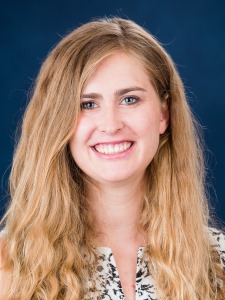
Kacey Bui
Kacey is studying the intersection of genome stability and cancer biology, with a focus on epidermolysis bullosa and other pediatric genetic diseases that predispose to cancer. She is committed to providing mentorship and support for colleagues who identify as black, indigenous, people of color (BIPOC), women, LGBTQIA+, and disabled. As a member of the MSTP Justice, Equity, Diversity and Inclusion (JEDI) Committee, Kacey has planned MSTP monthly meetings sponsored by JEDI, facilitated small group discussions on race and equity at monthly meetings and the annual MSTP retreat, and served as a mentor for undergraduate students from underserved communities. To build community and provide support for women in the program, Kacey has played a leadership role in the MSTP Women in Science and Medicine (WISM) group by organizing an annual dinner with a panel of women physician scientists, planning and facilitating an annual WISM-sponsored MSTP monthly meeting to share the experiences of women physician scientists and build allyship with men in our program, and organized student-only events that give women in the MSTP a chance to build community. These activities reflect Kacey's goal to make academic medicine more robust by making it more diverse, equitable, and inclusive.

Dominique Earland
Dominique is investigating the clinical and epidemiological patterns that contribute to the development of infectious disease. In the aftermath of the murders of George Floyd, Ahmaud Arbery, and Breonna Taylor, Dominique's leadership activities in White Coats for Black Lives (WC4BL) and the Student National Medical Association (SNMA) focused on fostering direct action events, petitions, street medic volunteering, discussion spaces, and community resource distribution. Together with a medical student peer, Dominique raised $6,000 in donations from social media to provide medical resources and basic supplies to South and North Minneapolis communities. Dominique serves on the Mentorship and Community Collaboration Committees of the Medical Education Reform Coalition. She helped create a SNMA physician mentorship program for students of color, hosted an event about healthcare and police brutality with City Councilman Jeremiah Ellison, and wrote an op-ed for the Minnesota Daily about the role of white supremacy in medical institutions. Within the MSTP, Dominique helped to develop a Justice, Equity, Diversity, and Inclusion (JEDI) proposal and organized an antiracism discussion for the 2020 MSTP retreat.
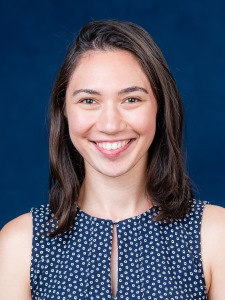
Andrea Maxwell
Andrea is studying sex and gender differences in addiction, with the broad goal of expanding her research to addiction in pregnancy, maternal stress and brain function, and the parent-newborn neurophysiological dyad. To make sustainable progress in improving the MD/PhD training environment, Andrea has focused on integrating diversity, equity and inclusion work into the MD/PhD curriculum and normalizing it as an essential component of physician scientist training. Andrea initiated and co-led the inaugural M1/M2 antiracism education series, which discussed perspectives by BIPOC physician-scientists, data regarding the importance of diversity in academia, guidelines for building an antiracist lab, critical race theory as it applies to research, and student-directed learning about specific topics of interest. She led the Events Planning Subcommittee for the first ever National MD/PhD Diversity, Equity, and Inclusion Summit, which was held in the summer of 2021, and has been a mentor in the MSTP Undergraduate Physician Scientist Mentoring Program.
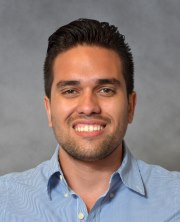
Javier Sierra Pagan
Javier seeks to understand the molecular mechanisms of cardiac development and disease, with a particular focus on why the mammalian heart possesses limited regenerative capacity. Javier's work in diversity, equity and inclusion has focused on being a mentor and ambassador for future generations to promote diversity, equity and inclusion in the field of medicine and research. Javier collaborated with other MSTP students to found the University of Minnesota chapter of the Society for the Advancement of Chicanos/Hispanics and Native Americans in Science (SACNAS) and serves as a University of Minnesota SACNAS ambassador and Graduate School ambassador for Puerto Rico. In 2020, Javier founded the MSTP Virtual Mentoring Program, which to date has supported 18 undergraduate and post-baccalaureate students (60% from underrepresented backgrounds) across the US who are interested in a career as a physician scientist. Participants meet regularly on a virtual platform during the academic year with current MSTP students in one-on-one meetings to work on specific goals and milestones related to MD/PhD careers and the MD/PhD admissions process. Javier is serving on the MSTP Student Admissions and Recruitment Committee, and was a seminar coordinator for students in the pre-MSTP summer research program.
2020-2021 recipients
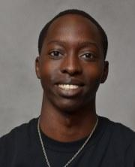
Ifeolu Akinnola
Ifeolu (Iffy) is completing PhD studies in tissue and organ regeneration and plans to continue addressing prejudice and exclusionary practices that persist in academic and biomedical settings, mentoring trainees from all backgrounds, and supporting the inclusion of individuals of all backgrounds into medicine and research. Together with Brian Trieu, Iffy co-founded the MSTP Undergraduate Mentoring Program through the student-led Diversity and Inclusion (DANDI) working group. This program has to date provided longitudinal mentoring for 14 undergraduate students, many from underrepresented groups, at the University of Minnesota and other local colleges. Iffy has also represented the MSTP at the Annual Biomedical Research Conference for Minority Students (ABRCMS), served as a pre-MSTP seminar coordinator, provided support and guidance to underrepresented applicants to the MSTP, and continues to provide guidance and counsel to undergraduate students at his alma mater, the University of Maryland – Baltimore County.

Alexandria Kristensen Cabrera
Alexandria (Alex) is focused on reducing disparities in maternal and infant birth outcomes, with a specific interest in measuring how structural racism impacts these disparities. To better understand how structural racism impacts our Black communities, Alex is conducting community based participatory research to better understand how Black women experience structural racism and how that may impact birth outcomes. Her advocacy and policy work includes serving as the Global and Migrant Health Chair for the Latino Medical Student Association, helping to organize and co-write content for the Twin Cities Health Care for Black Lives Protest organized by White Coats for Black Lives, volunteering as a street medic in North Minneapolis and with MaskUp North Minneapolis, leading social media efforts and creating educational materials for Hands on Advocacy, and serving as the sole student board member of the Political Action Committee of the Minnesota Medical Association. Alex helped start the MedEd Coalition Reform and is serving on the MSTP DANDI group and the Student Admissions and Recruitment Committee.
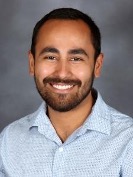
Roberto Lopez Cervera
Roberto is focused on understanding the neural correlates of cognition and affect through invasive electrophysiological methods in humans, developing non-invasive neuromodulation methodology to treat affective neuropsychiatric disorders, advocating for the integration of trauma-informed practices into social institutions, and partnering with marginalized communities to advocate for equitable policy changes related to health or education. In the MSTP, Roberto has catalyzed efforts to make the program more inclusive by diversifying social activities, serving on DANDI, mentoring an undergraduate student as part of the Undergraduate Mentoring Program, and modifying admissions information to include multicultural communities and events in the Twin Cities. Roberto has also worked with Hands on Advocacy, received funding to provide mental health education and conduct community-based research in Puerto Rico post-Hurricane Maria, and helped to organize community health and legal fairs in underserved Latinx communities and humanitarian trips to the US/Mexico border to provide psychosocial care for asylum-seekers. Roberto is also actively involved in new diversity, equity and inclusion initiatives in the Graduate Program in Neuroscience.
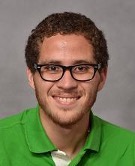
Carlos Perez Kerkvliet
Carlos seeks to better integrate surgical oncology with the emerging field of personalized medicine, to improve and personalize healthcare for underserved populations, and to be a role model to individuals underrepresented in medicine who would like to pursue a STEM career. As a Spanish-English interpreter at the Philips Neighborhood Clinic, Carlos was recognized in 2016 as Medical Clinician of the Year. He was one of the founding members of the University of Minnesota chapter of the Society for the Advancement of Chicanos/Hispanics and Native Americans in Science (SACNAS). Carlos has returned to his alma mater, the University of Puerto Rico – Cayey, to give scientific workshops that he designed. He served on the Student Admissions and Recruitment Committee for two years, represented the MSTP at the SACNAS National Conference and ABRCMS, and served on the search committee for the Medical School’s Vice Dean of Diversity, Equity and Inclusion. While participating in the Yale Ciencia Academy, Carlos joined You Can Do STEM, which produces Youtube videos on various topics of interest to students from diverse backgrounds interested in STEM careers. Carlos co-founded the En Arroz y Habichuelas podcast, which provides Spanish speakers from Puerto Rico, other Latin-American countries, and the US with information about COVID-19 and other science topics of interest.
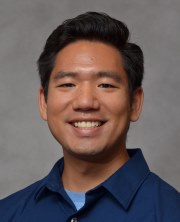
Brian Trieu
Brian is blending the principles of internal medicine and psychiatry to push our understanding of what we currently define as psychiatric disease. He is also focused on mentoring students from marginalized and underrepresented communities who are developing an interest in science and for those who are already on a path towards a career in biomedical science. Together with Iffy Akinnola, Brian co-founded the Undergraduate Mentoring Program, a longitudinal mentorship program for underrepresented undergraduate students that aims to reduce the time to apply to MD/PhD programs and to increase the retention of future MSTP students indirectly by establishing a supportive network. Brian has focused on recruitment in order to increase the reach of the mentoring program to other colleges in the Twin Cities. Brian has served on the MSTP DANDI Working Group since the establishment of DANDI in 2016, and has been invited to participate in undergraduate career development opportunities, such as the Empowering Seminar organized by the Medical School Office of Minority Affairs and Diversity, the Pursuing the Highest Degree workshop organized by the North Star Stem Alliance, and the Inspire Conference organized by the Institute for Engineering in Medicine. Brian is also actively involved in new diversity, equity and inclusion initiatives in the Graduate Program in Neuroscience.
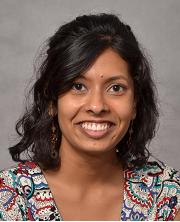
Sruthi Valluri
Sruthi seeks to help underserved communities as a physician and a researcher. Her research interests include the Supplemental Nutrition Assistance Program, food insecurity, and the evaluation of policy interventions designed to help ameliorate hunger at the community level. Sruthi has been involved in the Student National Medical Association (SNMA), mentored underrepresented students, completed coursework in Critical Race Theory, incorporated equity into her own research, co-authored letters to leadership asking for change, participated in panels on decolonizing curricula, and led the development of a year-long seminar series on incorporating anti-racism in nutrition research. Sruthi has served on the MSTP DANDI Group since 2016 and led efforts to develop the MSTP climate survey and organizing program-wide discussions on microaggressions and anti-racism. Sruthi is also a member of the Women in Science and Medicine Group and helped develop roundtable discussions, networking dinners, and informal social events. Sruthi has been involved in anti-racism work in the Division of Epidemiology, such as the development of new diversity, equity and inclusion statements for syllabi of courses.